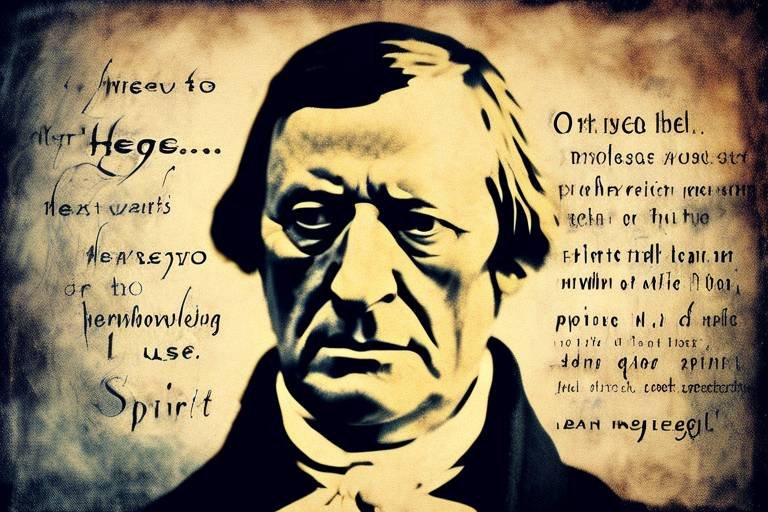Understanding Continental Philosophy vs. Analytic Philosophy
Philosophy is a vast landscape filled with diverse thoughts, ideas, and methodologies. Among this rich tapestry, two major traditions stand out: continental philosophy and analytic philosophy. While they both grapple with fundamental questions about existence, knowledge, and reality, their approaches and underlying assumptions differ significantly. Think of them as two different roads leading to the same destination, each with its own unique scenery and challenges. This article aims to illuminate these differences and similarities, providing a clearer understanding of how these two philosophical traditions have evolved and continue to influence contemporary thought.
The roots of continental and analytic philosophy can be traced back to distinct historical contexts that shaped their evolution. Continental philosophy emerged primarily in Europe, influenced by the likes of Hegel, Nietzsche, and Heidegger. These thinkers were concerned with the human experience, existence, and the complexities of society and culture. In contrast, analytic philosophy took shape in the early 20th century, with figures such as Bertrand Russell and Ludwig Wittgenstein emphasizing logical analysis and language. This divergence in origins has led to different trajectories and methodologies in addressing philosophical questions.
When it comes to methodology, continental and analytic philosophies adopt distinct approaches in tackling philosophical problems. Continental philosophy often embraces a broader, more interpretative lens, focusing on the nuances of language and the subjective experience of individuals. On the other hand, analytic philosophy prioritizes rigorous logical analysis and clarity, aiming to dissect arguments with precision. This fundamental difference can be likened to two artists using different techniques to paint a landscape: one opts for broad strokes and vibrant colors, while the other meticulously details every blade of grass.
Language serves as a pivotal element in both traditions, though its role is interpreted differently. Analytic philosophy is characterized by a commitment to logical clarity. Philosophers in this tradition often seek to eliminate ambiguity from their arguments, striving for a precise use of language that allows for clear communication of ideas. In contrast, continental philosophy tends to revel in the complexities of language, exploring how meaning can shift based on context and interpretation. This focus on the richness of language allows continental thinkers to engage deeply with existential and phenomenological themes.
Analytic philosophy is known for its rigorous standards of argumentation. Philosophers in this tradition employ various techniques to achieve a high level of precision, such as:
- Formal logic and symbolic representation
- Clear definitions and distinctions
- Emphasis on empirical evidence and scientific methods
These methods enable analytic philosophers to construct arguments that are not only coherent but also easily scrutinized and debated, fostering a culture of critical engagement.
In contrast, continental philosophy often embraces ambiguity and complexity. Thinkers like Sartre and Deleuze argue that human experience is inherently multifaceted, and philosophical inquiry should reflect this reality. By allowing for a more fluid interpretation of concepts, continental philosophy opens the door to a rich exploration of themes such as existentialism, post-structuralism, and phenomenology. This approach can be likened to a jazz musician improvising on stage, where the unpredictability of the moment can lead to profound insights.
Another significant difference lies in the treatment of subjective experience. Continental philosophy places a strong emphasis on individual experience and the subjective nature of reality. Philosophers like Merleau-Ponty argue that we cannot separate our understanding of the world from our lived experiences. In contrast, analytic philosophy often seeks objectivity, focusing on logical analysis and empirical data. This divergence raises intriguing questions: How do we balance subjective experiences with objective truths? Is it possible to fully understand human existence without acknowledging the individual perspective?
Both continental and analytic traditions have produced a wealth of influential philosophers whose ideas continue to resonate today. In the continental camp, figures like Hegel, Heidegger, and Sartre have profoundly shaped our understanding of existence, freedom, and the human condition. Conversely, analytic philosophy boasts luminaries such as Russell, Wittgenstein, and Quine, whose work has laid the groundwork for contemporary discussions on logic, language, and the philosophy of mind.
The legacy of continental thinkers is rich and varied, with each philosopher contributing uniquely to the discourse. For instance, Hegel's dialectical method has influenced countless fields, while Heidegger's exploration of being has opened up new avenues in existential thought. These thinkers remind us that philosophy is not merely an academic exercise but a vital part of our cultural and intellectual heritage.
Similarly, analytic philosophers have left an indelible mark on the field. Russell's work on logical atomism and Wittgenstein's ideas on language games have fundamentally altered how we approach philosophical problems. Their influence can be seen across various disciplines, including linguistics, cognitive science, and artificial intelligence, illustrating the far-reaching implications of their ideas.
1. What is the main difference between continental and analytic philosophy?
The main difference lies in their methodologies; continental philosophy focuses on subjective experience and the nuances of language, while analytic philosophy emphasizes logical clarity and objective analysis.
2. Can you give examples of philosophers from each tradition?
Sure! Notable continental philosophers include Hegel, Heidegger, and Sartre. In contrast, influential analytic philosophers include Russell, Wittgenstein, and Quine.
3. Is one tradition better than the other?
Neither tradition is inherently better; they offer different perspectives and methodologies that can complement each other in philosophical inquiry.

Historical Context
This article explores the key differences and similarities between continental and analytic philosophy, highlighting their historical contexts, methodologies, and major figures, ultimately providing a clearer understanding of these two philosophical traditions.
The development of continental and analytic philosophy is deeply rooted in different historical backgrounds, each shaped by unique cultural and intellectual movements. Continental philosophy can be traced back to the European Enlightenment, where thinkers like Immanuel Kant laid the groundwork for later existential and phenomenological explorations. This tradition flourished in the 19th and 20th centuries, influenced heavily by the tumultuous events of the time, including the rise of industrialization, the impact of the World Wars, and the existential crises that followed. Key figures such as Friedrich Nietzsche and Martin Heidegger emerged, challenging established norms and delving into themes of existence, meaning, and the human condition.
In contrast, analytic philosophy found its footing primarily in the early 20th century, emerging from the British and American philosophical landscapes. Influenced by the scientific advancements of the time, analytic philosophers such as Bertand Russell and Ludwig Wittgenstein sought to apply rigorous logical analysis to philosophical problems, emphasizing clarity and precision. The rise of logical positivism, a movement that advocated for the verification of statements through empirical evidence, further solidified the analytic approach. This methodology was a reaction against the perceived obscurity and ambiguity of continental thought, leading to a distinct separation between the two traditions.
To better understand the historical context, let's explore some key events that shaped the trajectories of these two philosophical traditions:
| Year | Continental Philosophy | Analytic Philosophy |
|---|---|---|
| 1781 | Kant publishes "Critique of Pure Reason" | |
| 1880s | Nietzsche's works challenge traditional morality | |
| 1920s | Logical Positivism emerges in Vienna | |
| 1950s | Heidegger's "Being and Time" gains prominence | Wittgenstein's "Philosophical Investigations" published |
As we can see, the historical contexts of these two traditions are not only distinct but also reflect the broader cultural and intellectual currents of their times. The evolution of continental philosophy has often been intertwined with existential questions and the complexities of human experience, while analytic philosophy has maintained a focus on logical rigor and clarity. This divergence in historical trajectory has led to the rich tapestry of ideas that characterize both traditions today.
Continental and analytic philosophies employ distinct methodologies in their approaches to philosophical problems. This section will explore these differences, including the emphasis on language, logic, and the role of subjective experience in each tradition.
Language plays a crucial role in both philosophical traditions. This subheading will discuss how analytic philosophy prioritizes logical clarity, while continental philosophy often focuses on the nuances of language and meaning.
Analytic philosophy is characterized by its commitment to precision and clarity in argumentation. This section will delve into the techniques used to achieve this level of rigor in philosophical discourse.
Continental philosophy often embraces ambiguity and complexity. This section will highlight how this approach allows for a richer exploration of existential and phenomenological themes.
The role of subjective experience varies significantly between the two traditions. This subheading will explore how continental philosophy often emphasizes individual experience, while analytic philosophy tends to focus on objective analysis.
Both traditions have produced influential philosophers whose ideas have shaped their respective fields. This section will introduce key figures from each tradition, highlighting their contributions and philosophical significance.
Continental philosophy boasts a rich lineage of thinkers, from Hegel to Heidegger. This section will provide an overview of their major ideas and the impact they have had on philosophy and culture.
Analytic philosophy is marked by influential figures like Russell and Wittgenstein. This section will discuss their contributions to logic, language, and the philosophy of mind, illustrating their lasting influence on the field.
- What is the main difference between continental and analytic philosophy? Continental philosophy focuses on subjective experience and existential questions, while analytic philosophy emphasizes logical clarity and objective analysis.
- Who are some key figures in continental philosophy? Important figures include Kant, Nietzsche, Heidegger, and Sartre.
- What are the historical roots of analytic philosophy? Analytic philosophy originated in the early 20th century, influenced by logical positivism and the scientific method.

Methodological Differences
When we dive into the world of philosophy, we quickly discover that the methodologies of continental and analytic philosophy are not just different—they're like two sides of a coin. Each tradition approaches philosophical questions from distinct angles, shaped by their unique historical contexts and intellectual legacies. Understanding these differences is crucial for anyone wanting to grasp the essence of philosophical discourse today.
At the heart of these methodologies lies the emphasis on language and logic. In analytic philosophy, clarity and precision are paramount. Think of it as a mathematician solving equations: every term must be defined, every step must be logical. Analytic philosophers often dissect arguments into their most basic components, aiming for a level of rigor that leaves no room for ambiguity. This approach is not just about being pedantic; it’s about ensuring that philosophical discussions can be as clear and unambiguous as possible, thus allowing for fruitful debate and discussion.
On the flip side, continental philosophy revels in the nuances of language. It’s akin to a painter blending colors on a canvas, where each stroke contributes to a larger, often ambiguous picture. Continental thinkers embrace complexity and the multifaceted nature of human experience. They argue that life is not always black and white, and neither should philosophical discourse be. This tradition often explores existential themes, emphasizing the richness of human subjectivity and the layers of meaning that can arise from a single concept.
Language, as a tool of expression, plays a pivotal role in both traditions but is utilized in markedly different ways. In analytic philosophy, the focus is on logical clarity. This means that philosophers strive to construct arguments that are easily understandable and can withstand rigorous scrutiny. They often employ formal logic and linguistic analysis to dissect philosophical problems. For instance, consider the famous work of Bertand Russell, who used symbolic logic to clarify philosophical issues, making them more accessible and precise.
Conversely, continental philosophy often prioritizes the nuances of meaning. Thinkers like Martin Heidegger and Jacques Derrida explore how language shapes our understanding of existence itself. They argue that words carry historical and cultural weight, and thus, interpreting them requires an appreciation of their context. This method encourages a rich exploration of themes like existentialism and phenomenology, where the subjective experience is paramount.
The hallmark of analytic philosophy is its commitment to precision and clarity. Philosophers in this tradition employ various techniques to achieve this level of rigor. They often break down complex arguments into simpler propositions, allowing for a clear pathway through intricate philosophical landscapes. This meticulous approach not only aids in understanding but also facilitates productive dialogue among philosophers. By focusing on logical structure, analytic philosophers aim to eliminate confusion and misinterpretation, making their discussions more accessible to a broader audience.
In contrast, continental philosophy thrives on ambiguity and complexity. This approach allows for a more profound exploration of themes that are often overlooked in analytic discourse. For instance, when discussing concepts such as freedom or identity, continental philosophers might delve into the emotional and existential dimensions that accompany these ideas. This nuanced perspective can lead to a richer understanding of human experience, illustrating how philosophy is not merely an intellectual exercise but a deeply personal journey.
Ultimately, the methodological differences between continental and analytic philosophy reflect their divergent views on the nature of reality and human experience. While analytic philosophy seeks to clarify and dissect, continental philosophy aims to explore and embrace complexity. Both approaches offer valuable insights into the human condition, and understanding their differences can enhance our appreciation of philosophical inquiry as a whole.

Language and Logic
Language is the lifeblood of philosophy, acting as both the medium and the message through which ideas are conveyed. In the realm of analytic philosophy, there is a pronounced emphasis on logical clarity and precision. Think of it as the difference between a well-structured blueprint and an abstract painting. Analytic philosophers strive to create arguments that are as clear and concise as possible, often breaking down complex ideas into simpler, more manageable components. This meticulous approach allows for rigorous examination and debate, ensuring that every term is defined and every premise is scrutinized. For instance, philosophers like Bertand Russell and Ludwig Wittgenstein have emphasized the importance of language in shaping our understanding of reality, arguing that many philosophical problems arise from misunderstandings of language itself.
On the flip side, continental philosophy takes a more nuanced approach to language. Rather than seeking to eliminate ambiguity, continental thinkers often embrace it, recognizing that language is inherently complex and layered with meaning. This perspective can be likened to a rich tapestry, where each thread contributes to a larger picture that cannot be easily unraveled. Philosophers such as Martin Heidegger and Jacques Derrida have explored how language shapes our experience of being and existence, suggesting that the meanings we derive from words are often tied to our subjective experiences. In this way, continental philosophy invites us to explore the depths of human experience rather than merely dissecting arguments into their logical components.
To illustrate the differences in how these two traditions approach language and logic, consider the following table:
| Aspect | Analytic Philosophy | Continental Philosophy |
|---|---|---|
| Focus | Logical clarity and precision | Nuance and complexity |
| Language | Structured and defined | Ambiguous and layered |
| Objective | Clear arguments and conclusions | Exploration of existential themes |
| Method | Formal logic and analysis | Phenomenological and existential inquiry |
This fundamental difference in approach highlights how serve as both tools and subjects of inquiry within these philosophical traditions. While analytic philosophers might view language as a precise instrument for conveying truth, continental philosophers see it as a rich, dynamic medium that reflects the complexities of human experience. Ultimately, understanding these distinctions not only enhances our appreciation of each tradition but also deepens our engagement with the philosophical questions that continue to shape our world.

Analytic Precision
Analytic philosophy is renowned for its commitment to precision and clarity in argumentation. This tradition emerged primarily in the early 20th century, with philosophers seeking to dissect complex problems using logical analysis and linguistic clarity. Think of it as a surgeon meticulously operating on a patient; every cut and stitch must be exact to ensure a successful outcome. In this context, the “patient” is often a philosophical problem, and the “surgery” is the rigorous examination of arguments and concepts.
At the heart of analytic philosophy lies a systematic approach to language and logic. Philosophers like Bertrand Russell and Ludwig Wittgenstein emphasized the importance of clear definitions and logical structure. They believed that many philosophical issues arise from misunderstandings of language, much like how a miscommunication can lead to chaos in a conversation. By clarifying language, analytic philosophers aim to resolve these confusions, thereby shedding light on the underlying issues.
To achieve this level of rigor, analytic philosophers often employ several techniques, including:
- Formal Logic: Utilizing symbolic notation to represent arguments clearly.
- Argument Analysis: Breaking down arguments into premises and conclusions to evaluate their validity.
- Thought Experiments: Imagining hypothetical scenarios to explore philosophical questions.
Moreover, the emphasis on analytic precision extends beyond just the mechanics of argumentation. It also influences the way philosophers approach philosophical problems. For instance, when tackling questions about the nature of reality or consciousness, analytic philosophers will often dissect these concepts into more manageable parts. This reductionist approach allows them to analyze each component in isolation, leading to clearer insights and conclusions. Think of it like a detective piecing together a mystery; by examining each clue individually, they can construct a coherent narrative that explains the whole.
In conclusion, the hallmark of analytic philosophy is its relentless pursuit of clarity and precision. This commitment not only shapes the way philosophical arguments are constructed but also fosters a culture of critical thinking and rigorous debate. As we navigate the complexities of philosophical inquiry, the tools and techniques developed by analytic philosophers continue to provide invaluable guidance, ensuring that our understanding remains as sharp as possible.

Continental Nuance
When we dive into the realm of continental philosophy, we find ourselves in a world that embraces complexity and ambiguity. Unlike its analytic counterpart, which seeks clarity and precision, continental philosophy revels in the rich tapestry of human experience. Think of it as a painter with a broad palette, mixing colors to capture the essence of a moment rather than merely outlining its form. This approach allows for a deeper exploration of themes such as existence, freedom, and subjectivity.
One of the fascinating aspects of continental philosophy is its focus on historical context and cultural influences. Philosophers like Heidegger and Sartre didn’t just ponder abstract concepts in isolation; they were deeply engaged with the political and social upheavals of their time. For example, existentialism arose in the aftermath of World War II, a period rife with uncertainty and despair. This historical grounding means that continental thinkers often address the human condition in ways that resonate with the struggles of everyday life.
Moreover, the continental tradition often employs a method that can be described as hermeneutical, which is a fancy way of saying they interpret texts and experiences. This interpretative approach allows for multiple meanings and insights to emerge, akin to how one might view a sculpture from different angles to appreciate its full depth. Philosophers like Gadamer emphasized that understanding is not just about finding the right answer; it’s about engaging in a dialogue that reveals the layers of meaning within a text or experience.
In contrast to the analytic focus on logical structure, continental philosophy often invites us to embrace the ambiguities of language. This is where the notion of deconstruction comes into play, a method popularized by Derrida. By questioning the assumptions underlying our language, deconstruction opens the door to new interpretations and insights, challenging us to reconsider what we think we know. It’s like peeling back the layers of an onion, revealing the complexity of thought that lies beneath the surface.
Ultimately, the nuance found in continental philosophy enriches our understanding of the human experience. It encourages us to engage with the world in a more profound way, recognizing that life is not always black and white. Instead, it is filled with shades of gray that invite reflection and contemplation. This tradition reminds us that philosophy is not just an academic exercise; it’s a vital part of our quest to make sense of our existence and our place in the universe.
- What is the main difference between continental and analytic philosophy?
Continental philosophy emphasizes historical context and subjective experience, while analytic philosophy focuses on logical clarity and precision. - Who are some key figures in continental philosophy?
Important figures include Hegel, Heidegger, Sartre, and Derrida, each contributing unique perspectives to the tradition. - Why is language important in continental philosophy?
Language is seen as a medium that carries multiple meanings and interpretations, allowing for a richer exploration of philosophical themes.

Subjective Experience
When diving into the realm of philosophy, one of the most fascinating aspects to consider is the role of subjective experience. This concept serves as a bridge between the two major traditions: continental and analytic philosophy. In the continental tradition, subjective experience is often seen as a fundamental component of understanding human existence. Think about it—our personal experiences shape our perceptions of reality, and this is something that many continental thinkers, such as Jean-Paul Sartre and Simone de Beauvoir, emphasize. They argue that our unique experiences contribute to our essence, allowing us to navigate the complexities of life in a way that is deeply personal and often existential.
On the flip side, analytic philosophy takes a more objective stance. Here, the focus is on logical analysis and clarity, often sidelining the subjective in favor of a more universal approach. This doesn't mean that subjective experience is ignored; rather, it is approached with a critical lens. Thinkers like Bertrand Russell and Ludwig Wittgenstein would argue that while subjective experiences are important, they must be scrutinized through the lens of language and logic to uncover universal truths. This leads to a fascinating tension between the two traditions, where subjective experience can either illuminate or obscure philosophical inquiry.
To illustrate this further, consider the following table that summarizes the contrasting views on subjective experience:
| Aspect | Continental Philosophy | Analytic Philosophy |
|---|---|---|
| Focus | Individual experience and existential meaning | Objective analysis and logical clarity |
| Key Thinkers | Sartre, Beauvoir, Heidegger | Russell, Wittgenstein, Quine |
| Methodology | Embraces ambiguity and complexity | Prioritizes precision and rigor |
| Goal | Understanding the human condition | Uncovering logical truths |
This dichotomy raises intriguing questions: Can we truly separate our subjective experiences from the objective truths we seek? Or do our individual experiences color our understanding of those truths? Both traditions offer valuable insights, and perhaps the greatest philosophical challenge lies in reconciling the two. By acknowledging the importance of subjective experience while also striving for clarity and objectivity, we can approach philosophical problems with a more comprehensive toolkit.
Ultimately, the exploration of subjective experience reveals the rich tapestry of human thought. Whether we lean towards the existential musings of continental philosophy or the precise arguments of analytic philosophy, the interplay between personal experience and objective analysis continues to shape our understanding of the world. So, the next time you ponder a philosophical question, ask yourself: How does my own experience inform my understanding, and can I step back to see the objective picture?
- What is the main difference between continental and analytic philosophy? Continental philosophy emphasizes subjective experience and existential questions, while analytic philosophy focuses on logical clarity and objective analysis.
- Who are some key figures in continental philosophy? Important figures include Hegel, Heidegger, Sartre, and Beauvoir.
- What role does language play in these philosophical traditions? Analytic philosophy prioritizes clear and precise language, whereas continental philosophy explores the nuances and complexities of language.
- Can subjective experience be reconciled with objective analysis? Yes, though it presents challenges, integrating both perspectives can lead to a richer understanding of philosophical issues.

Major Figures
Both continental and analytic philosophies have produced a plethora of influential thinkers whose ideas have significantly shaped their respective fields. These philosophers not only contributed to philosophical discourse but also impacted various aspects of culture, science, and society. Understanding their contributions can provide deeper insights into the philosophies they represent. Let's take a closer look at some of the major figures from both traditions.
Continental philosophy boasts a rich lineage of thinkers who have explored deep existential questions and the intricacies of human experience. Figures such as Georg Wilhelm Friedrich Hegel and Martin Heidegger are central to this tradition. Hegel's dialectical method emphasized the progression of ideas through contradictions, leading to a synthesis that reflects the dynamic nature of reality. His work laid the groundwork for later existential and phenomenological thought.
On the other hand, Heidegger's exploration of being and time delved into the nature of existence itself. He famously posed the question, "What does it mean to be?" which remains a cornerstone of existential philosophy. His ideas about authenticity and the individual's relationship with the world invite readers to reflect on their own existence in a profound way.
Other notable continental thinkers include Jean-Paul Sartre, who championed existentialism, emphasizing freedom and responsibility, and Simone de Beauvoir, who explored feminist philosophy and the construction of identity. Their works not only challenged traditional philosophical boundaries but also resonated with broader social movements, making their ideas relevant beyond academia.
In contrast, analytic philosophy is marked by figures like Bertand Russell and Ludwig Wittgenstein, who made significant contributions to logic and the philosophy of language. Russell, known for his work in mathematical logic, argued for clarity in philosophical writing, insisting that philosophical problems often stem from linguistic confusion. His collaboration with Alfred North Whitehead on Principia Mathematica is a landmark in the field of logic.
Wittgenstein, another titan of analytic philosophy, shifted the focus of philosophical inquiry to the use of language in everyday life. His early work, Tractatus Logico-Philosophicus, presented a picture theory of language, while his later writings, especially Philosophical Investigations, emphasized the fluidity of meaning and the importance of context in understanding language. This pivot from rigid structures to the nuances of language exemplifies the analytic tradition's commitment to clarity and precision.
Other prominent figures in analytic philosophy include Gilbert Ryle, who critiqued Cartesian dualism, and Daniel Dennett, known for his work on consciousness and cognitive science. Their contributions have enriched discussions on the philosophy of mind and the nature of human thought.
| Tradition | Major Figures | Key Contributions |
|---|---|---|
| Continental Philosophy | Hegel, Heidegger, Sartre, de Beauvoir | Dialectical method, existentialism, feminist philosophy |
| Analytic Philosophy | Russell, Wittgenstein, Ryle, Dennett | Mathematical logic, language use, philosophy of mind |
In summary, both continental and analytic philosophers have left indelible marks on the field of philosophy. Their diverse approaches and methodologies reflect the richness of philosophical inquiry, inviting us to ponder profound questions about existence, language, and the human condition.
Q: What is the main difference between continental and analytic philosophy?
A: The primary difference lies in their methodologies. Continental philosophy often emphasizes existential themes and subjective experience, while analytic philosophy focuses on logical clarity and language analysis.
Q: Who are some key figures in continental philosophy?
A: Notable figures include Hegel, Heidegger, Sartre, and de Beauvoir, each contributing unique perspectives on existence and identity.
Q: What contributions have analytic philosophers made?
A: Analytic philosophers like Russell and Wittgenstein have significantly influenced logic and language philosophy, advocating for clarity and precision in philosophical discourse.
Q: Can both philosophical traditions coexist?
A: Absolutely! Many contemporary philosophers draw from both traditions, recognizing that each offers valuable insights into complex philosophical issues.

Continental Thinkers
Continental philosophy is a rich tapestry woven from the thoughts and ideas of numerous influential thinkers. The tradition encompasses a wide range of philosophical inquiries, from existentialism to phenomenology, and has significantly impacted both philosophy and the broader cultural landscape. Key figures such as Georg Wilhelm Friedrich Hegel, Friedrich Nietzsche, Martin Heidegger, and Jean-Paul Sartre have each contributed unique perspectives that continue to resonate today.
At the heart of Hegel's philosophy lies the concept of the dialectic, a method of argumentation that emphasizes the development of ideas through contradictions and their resolutions. Hegel believed that reality is a dynamic process, constantly evolving through a series of conflicts and reconciliations. This notion has influenced not only philosophy but also political theory and social movements, as it suggests that progress often arises from struggle and contradiction.
Moving on to Nietzsche, his provocative ideas challenge conventional morality and the very foundations of truth. He famously declared that "God is dead," a statement reflecting the decline of traditional religious values in the modern world. Nietzsche's emphasis on the will to power and the concept of the Übermensch (Overman) invite individuals to transcend societal norms and create their own values. This radical perspective has inspired countless thinkers and artists, encouraging a reevaluation of personal authenticity and existential freedom.
Heidegger, on the other hand, delves into the nature of existence itself. His seminal work, Being and Time, explores the question of what it means to be. Heidegger's focus on being-in-the-world emphasizes the interconnectedness of human existence with the world around us. His ideas have profound implications for understanding human experience, temporality, and the nature of reality, making him a pivotal figure in existential and phenomenological thought.
Lastly, Jean-Paul Sartre embodies the existentialist movement, asserting that "existence precedes essence." This radical idea posits that individuals are not born with a predetermined purpose; instead, they must create their own meaning in an absurd and indifferent universe. Sartre's works, such as Being and Nothingness, explore themes of freedom, responsibility, and the human condition, encouraging readers to confront the weight of their choices and the inherent absurdity of life.
The contributions of these thinkers, among others, have shaped the landscape of continental philosophy. Their ideas challenge us to think critically about existence, morality, and the nature of reality. The richness of their thought invites ongoing dialogue, making continental philosophy a dynamic and ever-evolving field.
- What is the main difference between continental and analytic philosophy?
Continental philosophy often emphasizes subjective experience and the complexities of human existence, while analytic philosophy prioritizes logical clarity and objective analysis. - Who are some key figures in continental philosophy?
Notable thinkers include Hegel, Nietzsche, Heidegger, and Sartre, each contributing significantly to various philosophical inquiries. - What is the significance of the dialectic in Hegel's philosophy?
The dialectic represents the process of development through contradictions, suggesting that progress often arises from conflict and resolution. - How does Nietzsche's idea of the Übermensch challenge traditional values?
The Übermensch encourages individuals to create their own values, transcending societal norms and rejecting imposed moralities.

Analytic Philosophers
Analytic philosophy is often recognized for its rigorous approach to philosophical inquiry, focusing on clarity, precision, and logical analysis. This tradition has produced a remarkable array of thinkers whose contributions have significantly shaped the landscape of modern philosophy. Among the most influential figures in analytic philosophy are Bertand Russell and Ludwig Wittgenstein, both of whom have left indelible marks on various philosophical domains, including logic, language, and the philosophy of mind.
Bertand Russell, a pioneering figure in analytic philosophy, made substantial contributions to logic and the philosophy of language. His work on the foundations of mathematics and his development of logical atomism helped lay the groundwork for much of contemporary philosophy. Russell's famous paradox, which arose in his exploration of set theory, challenged the very foundations of mathematics and led to significant advancements in logical theory. His book, The Principles of Mathematics, is a cornerstone text that illustrates his commitment to clarity and logical rigor.
Moving on to Ludwig Wittgenstein, we find a philosopher whose ideas revolutionized the way we think about language and meaning. His early work, Tractatus Logico-Philosophicus, proposed a picture theory of language, suggesting that the structure of language reflects the structure of reality. Wittgenstein later shifted his focus in Philosophical Investigations, where he argued that meaning is derived from the use of language in specific contexts. This shift emphasizes the importance of ordinary language and everyday practices in understanding philosophical problems, marking a significant departure from his earlier views.
Other notable figures in the analytic tradition include Willard Van Orman Quine, who challenged the distinction between analytic and synthetic truths, and Saul Kripke, known for his work on modal logic and the philosophy of language. Quine's essay, Two Dogmas of Empiricism, critically examined the foundations of empiricism and argued for a more holistic understanding of knowledge. Meanwhile, Kripke's introduction of the concept of rigid designators has had profound implications for discussions about reference and necessity in language.
| Philosopher | Key Contributions | Notable Works |
|---|---|---|
| Bertand Russell | Logic, Philosophy of Language, Logical Atomism | The Principles of Mathematics |
| Ludwig Wittgenstein | Language Games, Meaning as Use | Tractatus Logico-Philosophicus, Philosophical Investigations |
| Willard Van Orman Quine | Holism, Critique of Analytic-Synthetic Distinction | Two Dogmas of Empiricism |
| Saul Kripke | Modal Logic, Rigid Designators | Naming and Necessity |
What sets analytic philosophers apart is their commitment to using formal logic and precise language to dissect philosophical problems. They often engage in detailed analyses of concepts, aiming to clarify arguments and eliminate ambiguities. This focus on clarity not only aids in philosophical discussions but also influences fields such as computer science and linguistics, where logical structures and language play crucial roles.
In summary, the contributions of analytic philosophers have been pivotal in shaping contemporary thought. Their emphasis on clarity, logical analysis, and the nature of language continues to impact various disciplines, making their work essential for anyone interested in the foundations of modern philosophy. As we delve deeper into the nuances of these thinkers, it becomes evident that their legacies are not just confined to philosophy but resonate throughout the intellectual landscape.
- What is the primary focus of analytic philosophy?
Analytic philosophy primarily focuses on clarity, precision, and logical analysis in addressing philosophical problems. - Who are some key figures in analytic philosophy?
Notable figures include Bertrand Russell, Ludwig Wittgenstein, Willard Van Orman Quine, and Saul Kripke. - How does analytic philosophy differ from continental philosophy?
Analytic philosophy emphasizes logical clarity and objective analysis, while continental philosophy often explores subjective experience and existential themes.
Frequently Asked Questions
- What is the main difference between continental and analytic philosophy?
The main difference lies in their methodologies and focus. Continental philosophy often emphasizes subjective experience, historical context, and existential themes, while analytic philosophy prioritizes logical clarity, precision, and objective analysis. Think of it as two different lenses through which to view the same world of ideas.
- Who are some key figures in continental philosophy?
Continental philosophy has been shaped by many influential thinkers. Notable figures include Hegel, who explored dialectics and history; Heidegger, known for his existential inquiries; and Sartre, who focused on freedom and responsibility. Each contributed unique perspectives that continue to influence various fields beyond philosophy.
- What role does language play in these philosophical traditions?
Language is crucial in both traditions but serves different purposes. Analytic philosophy emphasizes logical structure and clarity in language to convey precise arguments. In contrast, continental philosophy often delves into the nuances and ambiguities of language, exploring how meaning can shift based on context and experience.
- How does subjective experience differ between the two traditions?
In continental philosophy, subjective experience is central, focusing on individual perspectives and existential themes. Analytic philosophy, however, tends to adopt a more objective stance, analyzing concepts and arguments without heavily relying on personal experience. It's like comparing a personal diary to a scientific report—both valuable, but serving different purposes.
- Can you give examples of analytic philosophers and their contributions?
Absolutely! Key figures include Bertrand Russell, who made significant contributions to logic and the philosophy of language, and Ludwig Wittgenstein, known for his work on language games and the limits of language. Their ideas have profoundly influenced modern philosophy, especially in logic and the philosophy of mind.
- Are there any similarities between these two traditions?
Yes, despite their differences, both traditions seek to address fundamental philosophical questions. They each explore concepts like existence, knowledge, and reality, albeit through different methodologies. Both traditions also have a rich history of debate and dialogue, influencing each other over time.
- How can I choose which philosophical tradition to study?
Choosing a tradition often depends on your interests. If you prefer structured, clear arguments and logical analysis, analytic philosophy might be your path. If you’re drawn to existential questions and the exploration of human experience, continental philosophy could resonate more with you. It's all about what excites your intellectual curiosity!



















